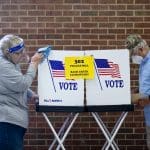GOP to spend $10 million to try to make it harder for people to vote
Donald Trump’s reelection campaign and the Republican National Committee are fighting to defend laws that make it harder for people to vote.

Donald Trump’s reelection campaign and the Republican National Committee have announced plans to spend more than $10 million in support of restrictive voting laws — and to recruit a cadre of lawyers to monitor the 2020 elections — according to a new Politico report.
The strategy includes defending Michigan laws that make voting more difficult. One bans arranging rides to the polls for anyone who is not “physically unable to walk,” while another restricts people from mailing in absentee ballots for others, Politico wrote.
These prohibitions are currently being challenged by Democratic super PAC Priorities USA, which says they put a “severe burden” on people voting.
In a court filing submitted Wednesday, the GOP defends them as “constitutionally valid statutes that the legislature has enacted to help structure and ensure the integrity of the electoral environment.”
Similar challenges are underway in other states with restrictive voting laws and RNC chair Ronna McDaniel told Politico they would fight them all.
“[Democrats are] trying to rig the game with frivolous lawsuits that do nothing but create electoral chaos, waste taxpayer money, and distract election officials in an attempt to advance the Democrats’ voter suppression myth because they know they can’t beat President Trump at the ballot box,” McDaniel claimed.
“These actions are dangerous, and we will not stand idly by while Democrats try to sue their way to victory in 2020,” she added.
But while Republicans have long railed against “voter fraud,” studies have found it is virtually non-existent. In recent years, the GOP has pushed for strict photo identification laws, reductions in the number of days available for early voting, cuts to the number of available polling places, and other measures aimed at making it harder for traditionally Democratic constituencies to vote.
A handful of Republican officials have even openly admitted that these policies are more about suppression than fraud prevention.
“Traditionally, it’s always been Republicans suppressing votes in places,” Justin Clark, a senior counsel to Trump’s 2020 reelection campaign, admitted in December.
“Let’s start protecting our voters. We know where they are,” he urged. “Let’s start playing offense a little bit. That’s what you’re going to see in 2020. It’s going to be a much bigger program, a much more aggressive program, a much better-funded program.”
That month, the House of Representatives passed the Voting Rights Advancement Act — a bill to restore voting rights protections decimated by a 2013 Supreme Court ruling. Just one House Republican voted for the bill; 186 voted against it.
Senate Majority Leader Mitch McConnell has vowed to block the bill and hundreds of other House-passed measures from even coming up for a vote in the GOP-controlled Senate.
Published with permission of The American Independent Foundation.
Recommended

New group will advocate for increased voting access for Alabamians with disabilities
A national group focused on expanding access to the ballot box for those with disabilities is launching a chapter in Alabama.
By Ralph Chapoco, Alabama Reflector - April 22, 2024
Youngkin blocks Democratic bills dealing with elections
Vetoes affect ranked choice voting and voting rights lawsuits
By Graham Moomaw, Virginia Mercury - April 11, 2024
Lawmakers close in on online voter registration in New Hampshire
New Hampshire lawmakers are inching closer to creating a statewide election portal, a bipartisan proposal that would allow residents to register to vote online.
By Ethan DeWitt, New Hampshire Bulletin - March 15, 2024










































































